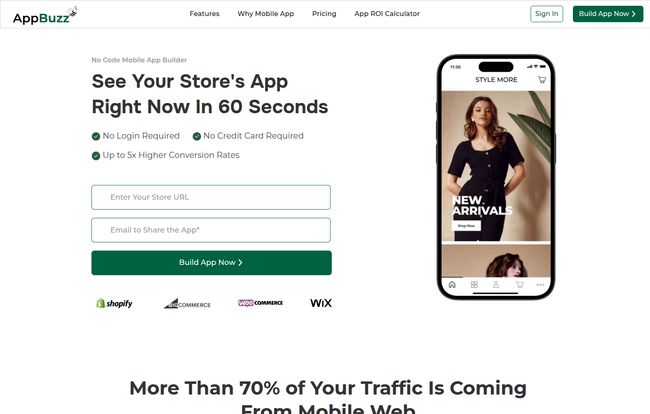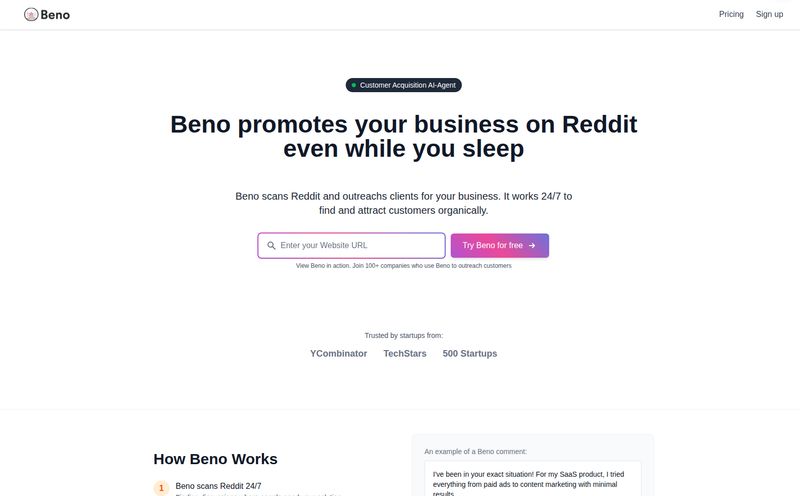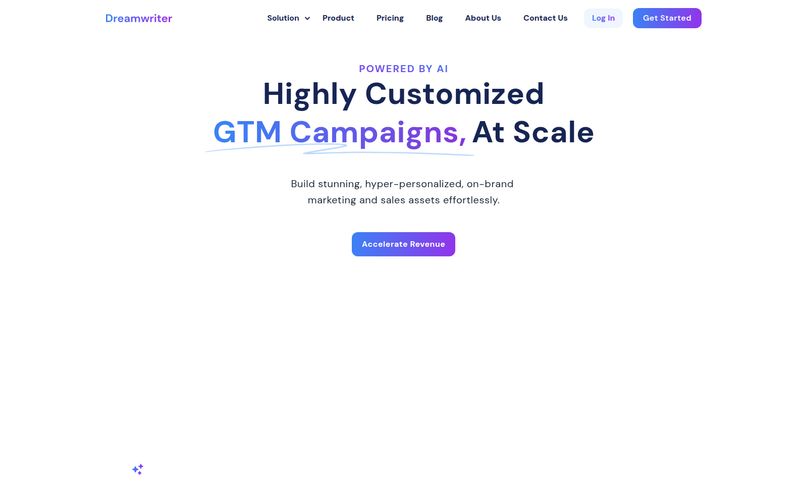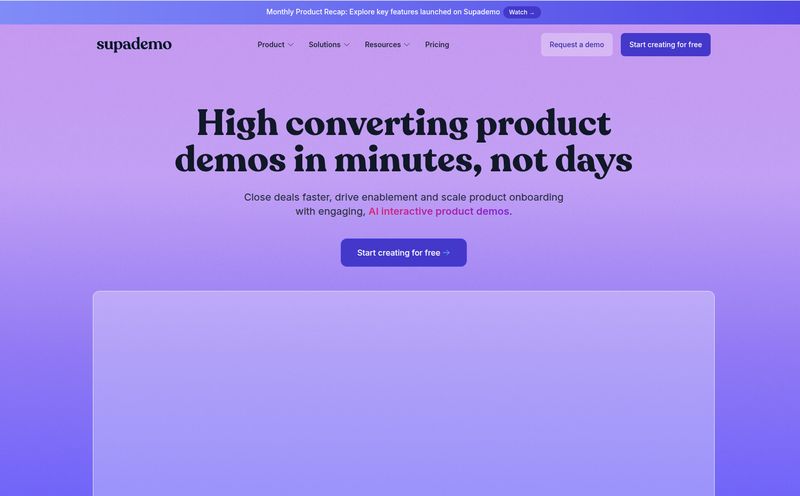You've poured your blood, sweat, and probably too much caffeine into your e-commerce store. You've tweaked your Shopify theme, A/B tested your product pages, and your Google Analytics is practically your homepage. You see that beautiful spike in mobile traffic—heck, maybe 70% or more of your visitors are on their phones. But then you look at your conversion rate, and... ouch. It's a bit of a ghost town.
Sound familiar? It’s the digital curse of the modern store owner. Getting people to your site is one thing; getting them to actually buy something on a clunky mobile browser is a whole other beast. For years, the solution has been a native mobile app. But that meant hiring expensive developers, months of back-and-forth, and a budget that could make a grown marketer weep. It was a non-starter for most of us.
But what if there was a shortcut? A way to get that slick, conversion-friendly app experience without selling a kidney? That's the promise of tools like AppBuzz. I’ve been hearing the chatter, so I decided to pop the hood and see if it’s the real deal or just more tech hype.
So, What Is AppBuzz, Really?
In a nutshell, AppBuzz is a no-code mobile app builder designed specifically for e-commerce platforms like Shopify, Bigcommerce, Wix, and WooCommerce. The term “no-code” gets thrown around a lot, but here it’s pretty accurate. It’s not about dragging and dropping elements to build an app from scratch. Instead, it cleverly takes your existing, beautiful website and wraps it in a native app container for both iOS and Android.
Think of it less like building a new car from spare parts and more like giving your current car a Formula 1 upgrade. All your products, collections, and even your site's design are automatically synced. When you update a product price on your website, it's instantly updated in the app. No extra work. No duplicate content management. That right there is a huge win in my book.

Visit AppBuzz
Why an App is More Than Just a Vanity Project
I get it. Another subscription? Another platform to manage? It's easy to dismiss a mobile app as a nice-to-have. But from an SEO and traffic generation perspective, you might be leaving serious money on the table. Your mobile website, no matter how optimized, is fighting a battle against browser tabs, slow load times and a million other distractions. A user gets a text, switches apps, and poof—they're gone. Maybe forever.
An app changes the game entirely. It lives on the user's home screen, a constant reminder of your brand. It’s faster, more immersive, and it gives you the ultimate weapon: push notifications. We’re not just talking about generic “10% off!” blasts. We’re talking about smart, targeted messages that can genuinely drive sales. This isn't just about conversions; it's about building a loyal, engaged customer base that you own. In a world where ad costs are skyrocketing and privacy changes are making retargeting harder, owning your audience is everything.
The AppBuzz Features That Actually Matter
Okay, so it makes an app. Cool. But lots of tools do that. Where AppBuzz tries to stand out is in its focus on revenue-driving features. It's not just about having an app; it's about making that app a profit center.
AI-Powered Push Notifications
This is the star of the show, in my opinion. Anyone can send a push notification. But sending the right one to the right person at the right time? That’s different. AppBuzz’s higher-tier plans use AI to trigger notifications based on user behavior. Imagine automatically sending a nudge to a user who viewed a product but didn't add it to their cart. Or a special welcome offer for a new user. And of course, the big one: abandoned cart campaigns. This is the kind of stuff that big-box retailers pay agencies a fortune to manage, and it's built right in here.
Seriously Simple E-commerce Integration
I've wrestled with enough APIs to know that “simple integration” is often a lie. But because AppBuzz is built for specific platforms like Shopify, the connection is incredibly straightforward. It's designed for store owners, not developers. You connect your store, and it just works. This lowers the technical barrier to entry so much that pretty much anyone can do it, and that’s a huge deal.
Real-Time Syncing Saves Your Sanity
I mentioned this before, but it bears repeating. The fact that any change on your website—a new product, a blog post, a sale banner—automatically appears in the app is a lifesaver. It means the app never becomes that outdated, neglected project you feel guilty about. It stays fresh because your website stays fresh.
Let's Talk About the Price Tag
Alright, the all-important question: what's this going to cost me? AppBuzz has a tiered structure, and it’s important to understand the details, especially the “Success Fee.”
| Plan | Monthly Cost | Success Fee | Best For |
|---|---|---|---|
| Startup | $99 | 3% | Getting started, testing the waters. Includes AppBuzz branding. |
| Growth | $199 | 2% | Growing stores that need white-labeling and scheduled notifications. |
| Scale | $499 | 1.25% | Established stores wanting the full suite of AI-powered campaign tools. |
| Enterprise | Custom | Custom | Large-scale businesses with unique needs. |
The success fee is an interesting model. Some people will hate it on principle. I see it as a double-edged sword. On one hand, it's an extra cost. On the other, it means AppBuzz is directly motivated to help you make more sales through the app. They only get paid more when you do. It's a performance-based partnership, which can be a powerful motivator for them to keep improving the revenue-generating features.
The Good, The Bad, and The Honest Truth
No tool is perfect. Let's break it down without the marketing gloss.
The Good Stuff
It’s fast. Seriously fast. You can have a functional app ready for submission to the app stores in a ridiculously short amount of time. Compared to the months and tens of thousands of dollars for custom development, this is a game-changer. It's also incredibly easy to use, and the focus on e-commerce-specific features like abandoned cart campaigns means it’s not a generic tool; it's sharpened for one purpose: selling more stuff.
Potential Downsides to Consider
This is not the tool for you if you want a completely unique, bespoke app with complex custom features. Because it's a wrapper for your website, you're limited by what your website can do. You can’t build a separate, app-only social network or a complex loyalty point system from scratch within AppBuzz. Also, that success fee will be a deal-breaker for some, especially if you have very thin margins. And, as is common with SaaS, the most powerful features—like those fancy AI notifications—are reserved for the pricier plans.
So, Who is AppBuzz Actually For?
In my professional opinion, AppBuzz hits a sweet spot for a specific type of business. If you’re a Shopify or WooCommerce store owner with established traffic but a leaky mobile conversion funnel, this tool is practically screaming your name. It's for the brand that's ready to move beyond just acquiring traffic and start building a loyal community.
If you're just starting out and have barely any traffic, an app might be premature. Focus on getting visitors first. If you're a massive enterprise like Amazon or Target, you're probably going to have an in-house team building a custom solution anyway. But for that huge, underserved market in the middle? AppBuzz could be a fantastic fit.
The Final Verdict
So, is AppBuzz the magic bullet that will solve all your mobile sales woes? No, of course not. No single tool is. But is it a powerful, accessible, and surprisingly clever way to fight back against low mobile conversions? Absolutely.
It bridges the enormous gap between having a simple mobile website and commissioning a full-blown custom app. It focuses on the features that actually impact your bottom line. If you're looking at your analytics and wondering where all your mobile money is going, converting that traffic into app users might just be the smartest move you make this year. It's an investment, for sure, but one that could pay for itself very, very quickly.
Frequently Asked Questions
- 1. How long does it actually take to get an app with AppBuzz?
- The initial setup is super fast—often in minutes. It generates a preview of your app almost instantly. The longer part of the process is submitting it to the Apple App Store and Google Play Store and waiting for their review and approval, which can take a few days to a couple of weeks.
- 2. Can I customize the look of my app?
- Because the app mirrors your website, the primary way to customize the look is by customizing your website's theme. The app will adopt those changes. This ensures brand consistency but offers less app-specific design freedom than a from-scratch builder.
- 3. Is this better than just having a good responsive website?
- They serve different purposes. A responsive site is essential for discovery and first-time visitors from search or social. An app is for turning those visitors into loyal, repeat customers. The app offers a better user experience, higher engagement, and the powerful channel of push notifications that a website just can't match.
- 4. What kind of e-commerce platforms does AppBuzz support?
- AppBuzz is built to integrate directly with major e-commerce platforms, including Shopify, BigCommerce, Wix, and WooCommerce. This tight integration is one of its key strengths.
- 5. How is the 'Success Fee' calculated?
- The success fee is a percentage of the revenue generated through the mobile app only. It's not a percentage of your total store revenue. This ensures you're only paying the fee on sales that the app directly helped you generate.
- 6. What are AI-powered push notifications?
- Instead of you manually sending a notification to all users, the AI system analyzes individual user behavior. It can then automatically send targeted messages, like a reminder about an abandoned cart or a special offer for a product someone viewed multiple times. It’s a smarter, more personalized approach to marketing.



